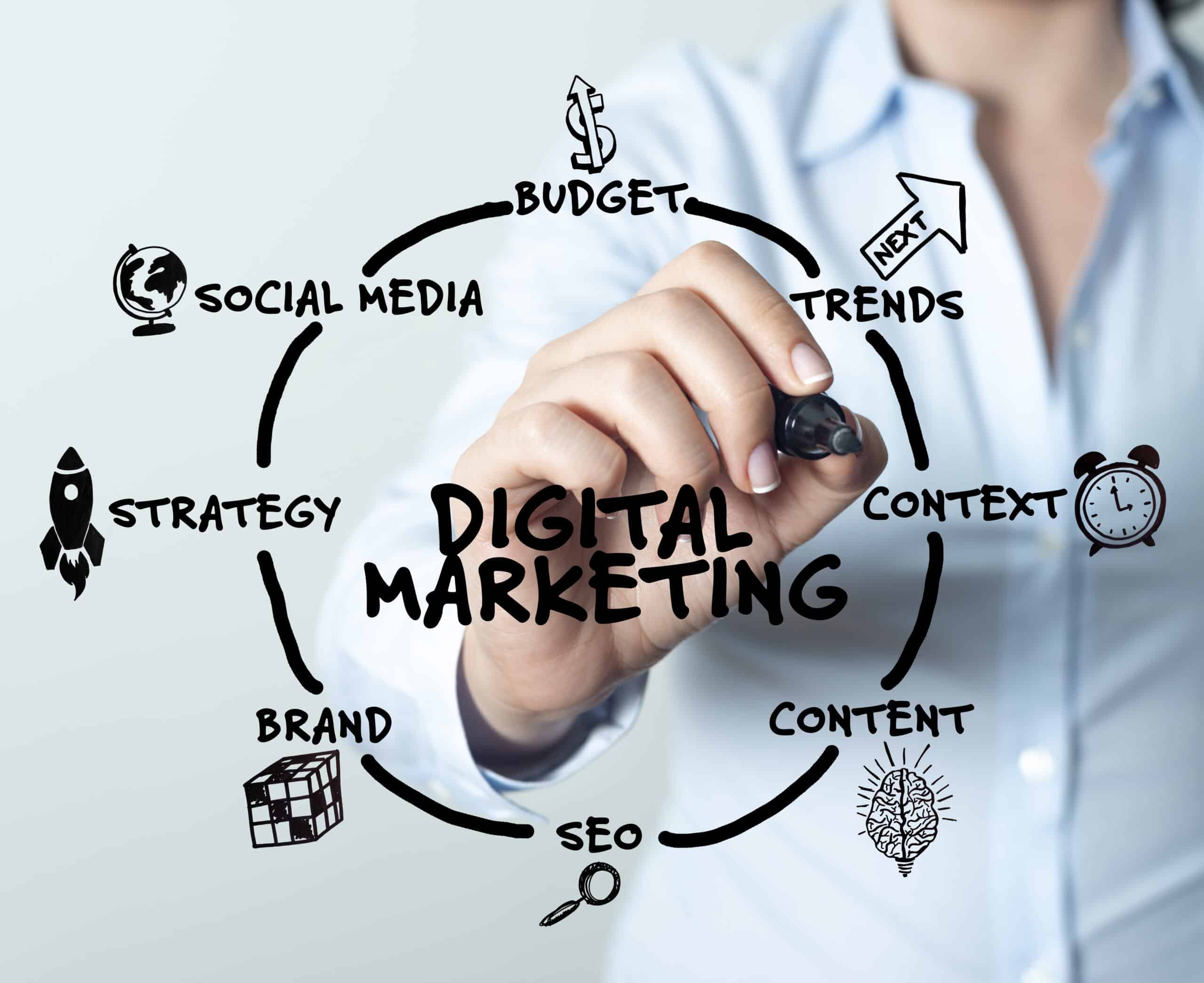As we turn the calendar to 2021, we’re facing a variety of challenges throughout our society that have a significant impact on many business owners. The COVID-19 pandemic is still ravaging the country and as a result, we face uncertain economic times. However, these challenges also present an opportunity for your business to establish a new relevance in our changing world and position itself for success moving forward. Your marketing strategy is a crucial tool to leverage this opportunity.
Creating an annual marketing budget is always an important task for every business. In order for your business to continue to grow and thrive, you need to retain loyal customers and experience an infusion of new customers who will hopefully remain loyal to you for years to come. This requires you to get the word out about the products and services you offer, as well as why your company is the right provider to choose. Without an adequate marketing budget, you won’t be able to raise the awareness necessary to grow your business.
Why Do I Need a Formal Marketing Budget?
It’s one thing to understand the need to invest in online marketing efforts. It’s another thing to take the time necessary to thoughtfully plan out this budget so that you know precisely what you can spend on marketing and which channels you plan on devoting these resources to. While this level of planning requires a lot of work, it will be well worth the time. You’ll experience a variety of benefits when you create a formal plan for your marketing budget:
- It keeps you on track financially – Many of the marketing strategies you’ll choose to implement are costly. Creating a marketing budget will keep you on track and prevent you from overspending or underspending, both of which can have a devastating impact on the long-term success of your business.
- It helps you use your resources more effectively – Once you’ve established the amount of money you can spend on marketing, you can more effectively allocate those resources towards specific strategies that will achieve your goals. You’ll be able to identify which strategies fit into your budget, as well as whether you can afford a comprehensive package provided by a digital marketing agency.
- It helps you establish realistic goals and benchmarks – It’s crucial that you define certain benchmarks and goals for your marketing efforts to ensure they’re achieving their intended outcome. You can use your budget to set realistic expectations for what each marketing strategy should deliver based on the financial resources you devote to them. This will help you measure the effectiveness of your efforts over time and ensure you have the data necessary to know when it’s time to pivot to a new strategy.
- It facilitates long-term planning – The resources you allocate to marketing must get you through the year, and this will require some long-range planning. If you overspend early in the year, you may find that you lack the budget to continue certain valuable campaigns as the year progresses. While flexibility is always crucial when creating a marketing budget, establishing an overarching long-term plan to fund your efforts will help ensure these efforts remain consistent throughout the year.
View Your Marketing Budget as an Investment, not a Cost
 Many companies view their marketing efforts as a cost, and this can be problematic. While it is true that your marketing budget must be included as part of your annual business expenses, viewing them as a “cost” may cause you to look for ways to cut corners on this expenditure. This is especially true during an economic downturn when money may be tight and you’re operating on smaller margins than you’re typically used to.
Many companies view their marketing efforts as a cost, and this can be problematic. While it is true that your marketing budget must be included as part of your annual business expenses, viewing them as a “cost” may cause you to look for ways to cut corners on this expenditure. This is especially true during an economic downturn when money may be tight and you’re operating on smaller margins than you’re typically used to.
Instead, it’s important to see your marketing efforts as an investment in the ongoing growth and success of your business. Creating a budget will let you use this money more effectively and creatively in order to get the most out of this investment in your company’s future.
Your marketing strategy is the most effective tool at your disposal to tell your company’s story, grow your brand and build stronger relationships with your customers. When you cut back your marketing efforts, you’ll become less visible to current and future customers, and your brand won’t resonate as strongly with your target audience. Over time, this can lead to significant customer attrition rates.
Many of your competitors may cut back on their marketing budgets in 2021 due to the economic crisis we’re currently facing. However, it’s important that you resist the urge to follow suit. Instead, by maintaining or even increasing your marketing budget for the upcoming year, you have an opportunity to remain relevant with your audience at a time when your competitors may be falling off their radar.
This will pay huge dividends as our economy recovers following the pandemic. Studies have demonstrated that by investing heavily in your marketing budget during a recession, you’ll be better positioned to thrive long term compared with companies who don’t keep their brand on their customers’ minds during an economic downturn.
Read our article: 5 Questions to Get Your Marketing Budget Approved
What Does Your Marketing Budget Pay For?
When planning out your 2021 marketing budget, you may find the overall dollar amount to be a bit shocking. However, it’s important to remember that running a successful marketing campaign is expensive for a reason. There are a lot of costs that need to be covered by this budget:
- The costs associated with running specific campaigns – Certain campaigns will require an ongoing cost to fund. For example, paid search (PPC), influencer marketing campaigns and social media ads will all require a monthly budget to achieve your desired results.
- Marketing consulting services – Unless you have an in-house team of experienced digital marketing professionals, you’re most likely going to need help from an outside agency. Website design and development, SEO services and content marketing are crucial components to a digital marketing campaign, and most companies simply lack the personnel to manage these tasks in-house. If you need to recruit the assistance of industry experts, you’ll need to factor the costs of their services into your budget.
- Software – Even if you work with an external agency or a team of freelance professionals, there are certain aspects of your marketing campaign that you’ll likely want to manage in-house. There are a wide range of software tools to streamline this process. However, most of the useful keyword research tools, social media schedule software, email marketing automation platforms and other marketing tools cost money for a license.
- Training – Digital marketing is a rapidly evolving field, and you’ll want to make sure any team members responsible for managing and implementing your campaign remain up to date on the latest best practices. This may involve paying for online courses, subscriptions to industry-leader publications, or in-person workshops and conferences.
- Employee compensation – Your marketing budget also goes to pay any employees responsible for implementing your strategies. Even if only part of their role is devoted to marketing, this must be factored into your marketing budget.
Factor External Costs When Establishing Your Marketing Budget
While the list above highlights the many costs associated with running your marketing campaign, we also realize the amount of money you can allocate to these expenses are largely dependent on the other costs associated with running your business, including:
- Operational costs (manufacturing and shipping products)
- Payroll costs
- Business overhead expenses (office space, electricity, Internet, office equipment)
These costs, along with your marketing costs, impact your profitability and determine how much money you can invest in specific services. These costs will also help you set up benchmarks for desired ROI on your marketing efforts.
Establish Goals for Your Marketing Efforts
 It’s important to establish goals for what you’re trying to achieve with your marketing efforts. Without clearly defined goals, you won’t be able to determine a reasonable budget to help achieve them.
It’s important to establish goals for what you’re trying to achieve with your marketing efforts. Without clearly defined goals, you won’t be able to determine a reasonable budget to help achieve them.
Some common goals for a marketing campaign include:
- Increasing leads
- Closing more sales
- Boosting brand awareness
- Growing your subscriber list
Make sure your goals are specific. Generic goals such as “increase leads” won’t help you determine how much money it will take to reach your goals or provide a framework to measure the success of your efforts. A more specific goal such as “increase monthly leads by 25%” is easier to measure and gives your team a precise target to reach. By establishing the percentage of increase you’re looking for and the specific timeframe you want to measure, you’ll have a better sense of what it will cost to achieve your goals.
Determine the Best Strategies to Use
There are a wide range of digital marketing strategies to choose from, and not all of them will be appropriate for your business. The right strategies for you will depend on the specifics of your industry, your target audience and the marketing goals you’ve established. Rather than spread your resources thin across every possible strategy, it’s better to choose a few that are ideally suited to your goals.
Some potential digital marketing strategies to incorporate into your budget include:
 Custom web design – When was the last time you updated your website? If it’s been a few years, it might be time for a redesign. Your website is the cornerstone of your digital marketing efforts. It’s one of the most effective tools you have to raise awareness of your brand and connect with your audience. A customized website that is built using the most up-to-date coding practices is essential to achieving your marketing goals.
Custom web design – When was the last time you updated your website? If it’s been a few years, it might be time for a redesign. Your website is the cornerstone of your digital marketing efforts. It’s one of the most effective tools you have to raise awareness of your brand and connect with your audience. A customized website that is built using the most up-to-date coding practices is essential to achieving your marketing goals.- SEO – A great website does you no good if your audience can’t find it. Search engine optimization (SEO) is a crucial part of any digital marketing strategy. It helps boost your website’s search rankings, allowing you to drive more traffic to the pages your audience will find relevant, informative and useful. This will ultimately help you grow your brand, position yourself as an industry-leading authority and convert more leads.
- Content marketing – Content marketing goes hand-in-hand with your SEO strategy. In order to rank well on search engines, you need content that delivers the information your audience needs. This can come in a variety of forms, including web pages, blog posts, videos, infographics, case studies, eBooks and other formats that are ideally suited to delivering the information your audience needs.
- PPC – Pay per click (PPC) and other forms of paid search advertising can be an effective way to ensure you appear at the top of the search results, especially in industries where organic SEO is extremely competitive. These ads can significantly improve your ability to reach your audience and convert more leads.
- Social media marketing – Roughly 80% of Americans use social media platforms. By tapping into this marketing strategy, you can more effectively raise awareness of your brand and build relationships with potential customers who may be interested in your product or service. Social media marketing can involve organic posts, paid ads or a combination of the two.
- Email marketing – Email marketing allows you to nurture leads as they travel along the sales funnel. By customizing your email marketing content, you can create a wide range of campaigns that meet the varied needs of your audience depending on where they are in the sales process.
- Local SEO – In recent years, local SEO has become an increasingly important way to show up in the local search results provided by Google. By optimizing your Google My Business listing, you can drive more local traffic to your business.
Research Marketing Provider Costs
Once you decide which strategies you want to use, you’ll need a team to implement them. Whether this is done by an in-house marketing team, a digital marketing agency or freelance marketing professionals, you should understand how much each option will cost you.
Consider the following factors when determining the cost of each option:
- In-house marketing team – The primary cost associated with an in-house marketing team involves the salary and benefits for each employee. However, there may also be certain software tools that your team will need to pay for in order to manage your campaign. In addition, it’s possible that you’ll still need to hire an outside provider to manage certain aspects of the campaign. Make sure you factor in these additional costs for third-party service providers.
- Freelance marketing professionals – Freelancers typically specialize in one specific aspect of the marketing process. For example, a freelance copywriter may handle all of your content, while an SEO specialist will focus on optimizing the site. If you’re building a new website, you may need the assistance of a freelance designer who creates the website layout and a freelance web developer who builds the site. The cost of freelancer labor will depend on their experience, the software tools they use, and several other factors. An a la carte approach to your marketing can potentially prove costly if you need to work with multiple freelancers.
- Digital marketing agency – Digital marketing agencies provide comprehensive services in order to manage your entire campaign. They provide the team, tools and industry knowledge to ensure your campaign is run properly. For many companies, the insights provided by an agency can be invaluable, especially if you need assistance developing your marketing campaign.
The right solution for you will depend on the unique needs of your business as well as the amount of money allocated to your annual marketing budget. By researching the costs of all these solutions, you’ll have a better sense of what you can afford and what you can expect to get for your money.
Webolutions Can Help You Get the Most Out of Your 2021 Digital Marketing Budget
Webolutions is a Denver digital marketing agency providing the robust services you need to get the most out of your budget. As part of our process, we encourage all of our clients to engage in annual planning with us. During this meeting, we explore your upcoming marketing goals in order to develop a customized campaign to achieve your desired results. We’ll then establish a set of metrics to measure the success of your campaign over time.
Over the last 25 years, we’ve refined our approach to reflect the evolving digital marketing landscape. This has enabled us to elevate our clients’ messaging so that they continue to grow and thrive year after year. Our approach incorporates the following pillars of effective marketing:
- Market positioning – We’ll work with you to crystalize your purpose and values in order to clearly convey this to your audience. This will drive our brand platform which ensures all of your messaging remains consistent.
- Spreading your message – We’ll identify the right combination of strategies necessary to ensure your message reaches your target audience. We’ll then craft that message to ensure it resonates with your customers.
- ROI-based measurement – Everything we do is driven by data. We’ll work with you to set specific marketing goals and then track their effectiveness to ensure you’re receiving the ROI you expect from these efforts.
- Long-term planning – Where do you see your company in three years? In five years? We’re committed to helping you get there. As part of our annual planning, we’ll evaluate your long-term goals and make sure your current marketing efforts are setting you up to achieve them.
Please contact Webolutions today to find out how we can help you get the most out of your 2021 digital marketing budget. We serve clients nationwide from our offices in Denver, Colorado.
- 5 Ways Businesses in Denver Can Optimize Their Digital Marketing Strategy - March 25, 2025
- How to Organize Your Digital Marketing Strategy for Optimal Results - March 11, 2025
- How Can We Expect Digital Marketing to Change Over the Next 3 Years? - February 21, 2025



